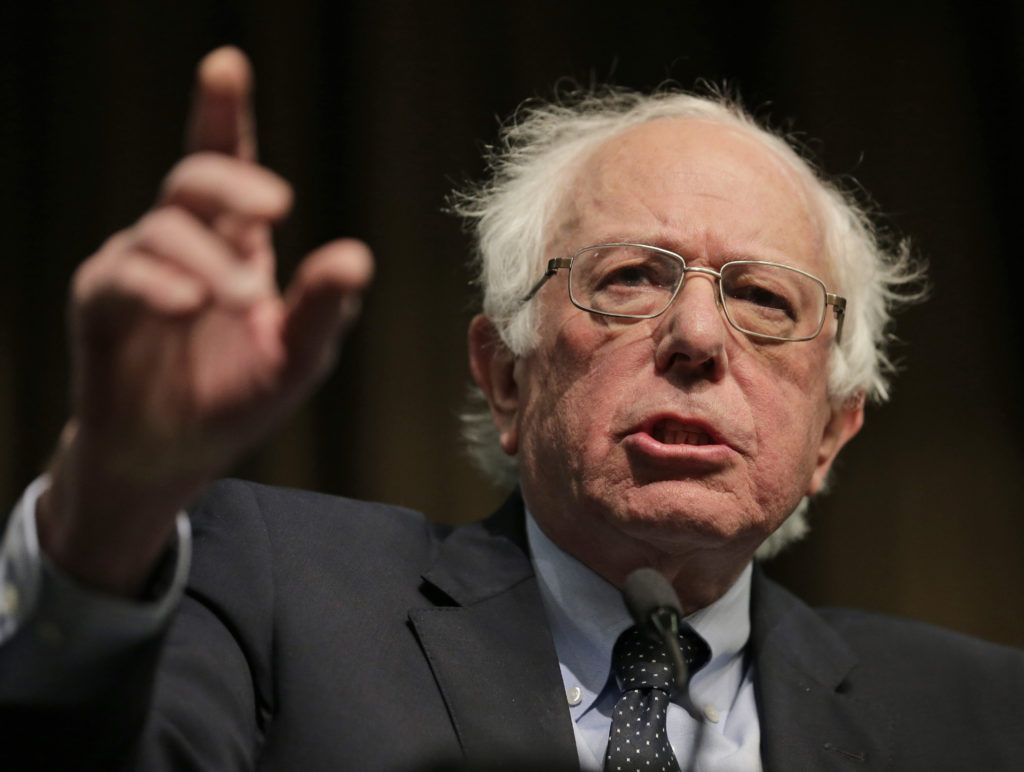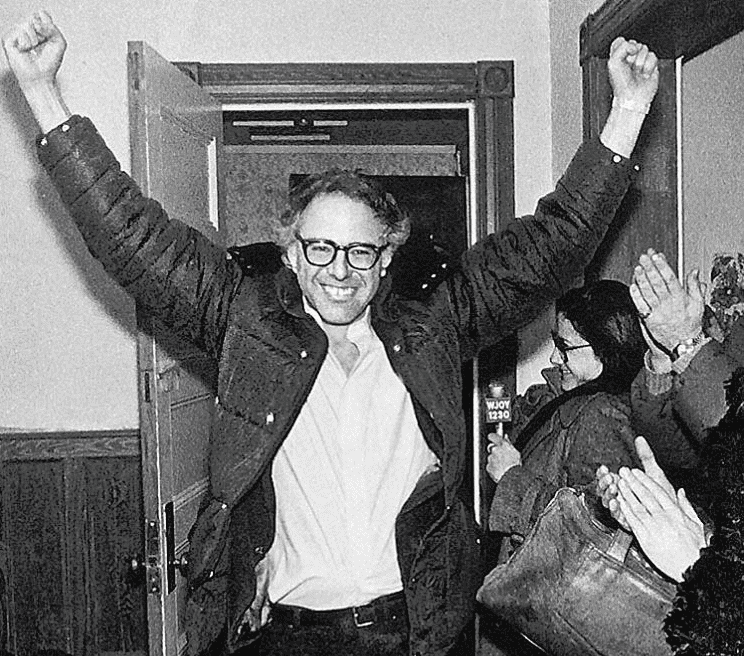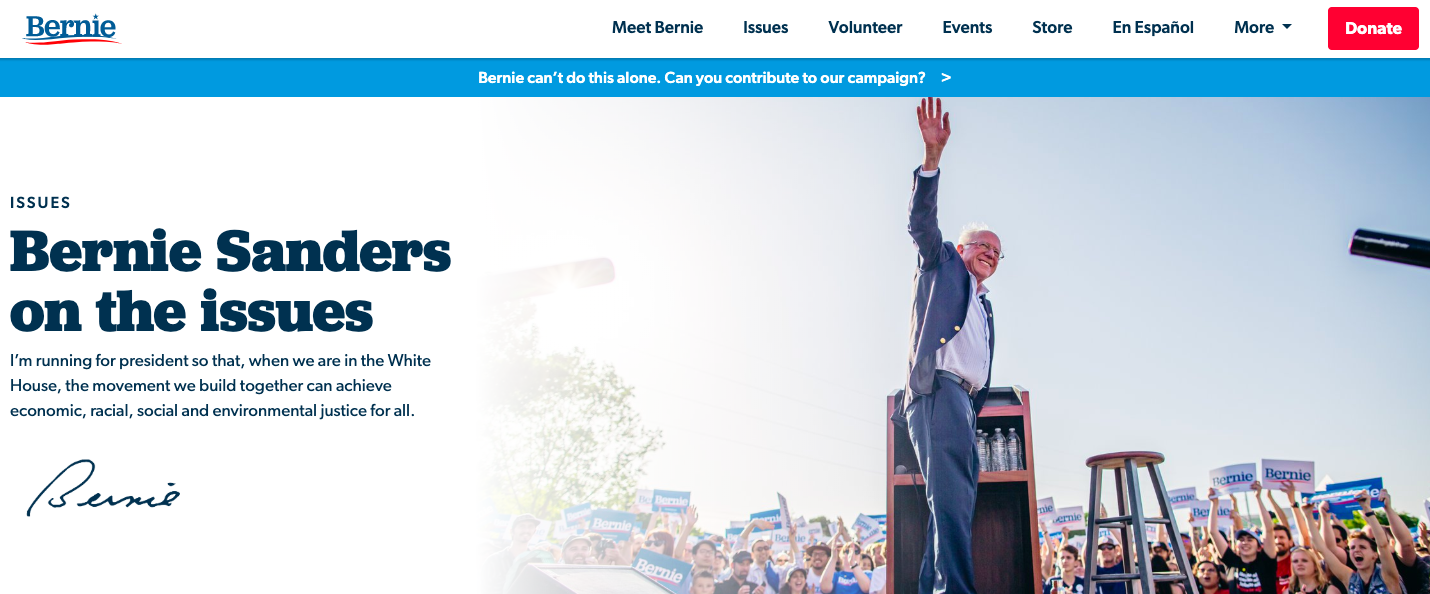Who is Bernie Sanders?

A few minutes every morning is all you need.
Stay up to date on the world's Headlines and Human Stories. It's fun, it's factual, it's fluff-free.
After losing the 2016 Democratic presidential primary to Hilary Clinton, Vermont Senator Bernie Sanders announced in February 2019 that he was running for president a second time. In the 12 hours following his announcement, Sanders raised US$4 million from 150,000 donors.
Since that time, the self-styled democratic socialist has established himself as a frontrunner in the contest. He has refused to accept corporate money and has raised millions off of individual donations.
On March 1, 2020, the Sanders campaign announced that it had raised US$46 million from 2.2 million donations for the month of February, the highest amount of any candidate in the 2020 campaign.
The Vermont Senator’s campaign has argued that Sanders’ overwhelming victory in the Nevada caucus is proof that the candidate is backed by “a multigenerational, multiracial coalition" capable of beating President Trump in November.
But Sanders’ rise to the top of the Democratic field has been met by concerns about his electability and his health. Some at the top of the party believe that there is little appetite for his agenda in America. Concern has also arisen following a heart attack the 78-year-old candidate suffered in October 2019.
Early life

Bernie Sanders was born into a working-class Jewish family in Brooklyn, New York. His father, Elias Ben Yahuda Sanders, immigrated to the US from what was then Austria-Hungary, now Poland. His mother, Dorothy, was born in New York City to parents who immigrated to America from the Russian Empire.
If elected, Sanders would become the first Jewish president of the United States.
Sanders became interested in politics from an early age. He has said that the rise of Adolf Hitler showed him “that politics is, in fact, very important." Sanders has described his college years in Chicago as, “the major period of intellectual ferment in my life." While there Sanders joined the Young People’s Socialist League and was active in the Civil Rights Movement.
Political career
Bernie Sanders’ political career began in 1981 when he ousted the then-incumbent Democratic mayor of Burlington, Vermont, Gordon Paquette, from office.
As mayor, he used a budget surplus to fix the city’s deteriorating streets. He also pursued large scale revitalization projects, often working with large businesses in the area.
When a developer put forward plans to build expensive property along Burlington’s waterfront, Sanders successfully campaigned against the proposal. Later, he supported a successful plan that redeveloped the waterfront area into a mixed-use district featuring housing, parks and public spaces.
Some critics argue that during his time as mayor of Burlington, Sanders wasted time on foreign affairs that should have been spent on local issues. Sanders took trips to Nicaragua and the Soviet Union during his time in office and, under his mayoralty, the number of families living in poverty in Burlington grew to 798 in 1990 from 563 in 1980, an increase of 42 percent.
US House of Representatives
After failing to win the election for Vermont’s sole seat in the US House of Representatives in 1988, Sanders ran again in 1990 as an Independent and was elected with 56 percent of the vote.
While in the House, Sanders became known as the “amendment king" for his ability to work with both Republicans and Democrats to get legislation passed.
Sanders was also a vocal critic of the US Patriot Act and voted against the Iraq War. He also voted against the Brady Bill, which mandated federal background checks and waiting periods when buying guns.
In the South Carolina debate in February, Joe Biden criticized Sanders for voting to approve the Protection of Lawful Commerce in Arms Act in 2005, legislation that shields the firearms industry from wrongful death lawsuits. According to The New York Times, Sanders has since stated his opposition to the act, acknowledging that his vote to approve it had been “a bad vote."
US Senate
After serving in the House of Representatives for 16 years, Sanders ran and was elected to the US Senate. Though Sanders ran and won as an Independent, he won the backing of many prominent Democrats, including the current Senate Minority Leader, Democrat Chuck Schumer, and former Vermont Governor Howard Dean. Even President Barack Obama, at the time a Senator from Illinois, campaigned to help get Sanders elected.
During his time in the Senate, Sanders has been at the forefront of efforts to end US support to Saudi Arabia. He is also a co-sponsor of a resolution known as the Green New Deal, which is a plan to transition the US to using only 100% clean and renewable energy within the next decade.
Sanders has often ranked among the most popular politicians in the Senate. Research conducted by Public Policy Polling in 2011 found that Sanders was the third most popular US Senator. By 2015, polling by Morning Consult showed Sanders was the most popular Senator, with an approval rating of 83 percent.
Though many view Sanders as a hardliner, the record shows that he’s no stranger to compromise. In one example, the Vermont Senator voted for Obamacare despite having previously criticized it for not having “a strong public option."
2016 presidential election campaign
Sanders ran for president in 2016. He finished in second place in the Democratic primary, with 46% of pledged delegates, behind eventual nominee Hillary Clinton. Leaked emails from the Democratic National Committee appeared to show that party officials, including committee chair Debbie Wasserman Schultz, were biased against Sanders and favored Hillary Clinton during their primary campaign.
Sanders endorsed Hillary Clinton at a rally in June 2016.
2020 agenda
In an email to supporters after announcing his 2020 candidacy, Sanders said, “Together, you and I and our 2016 campaign began the political revolution. Now, it is time to complete that revolution and implement the vision that we fought for."
By running for president in 2020, Sanders wants to “achieve economic, racial, social and environmental justice for all,” according to his website.

Many of Sanders’ positions — Medicare for All, the Green New Deal and tuition-free college education, among others — are to the left of much of the Democratic Party.
Sanders has also pledged to expand social security, raise the minimum wage to $15, and to legalize marijuana.
After facing criticism about the cost of his policies, the Sanders campaign recently released details about how he will pay for all his major plans.
[article_ad]




Comments ()